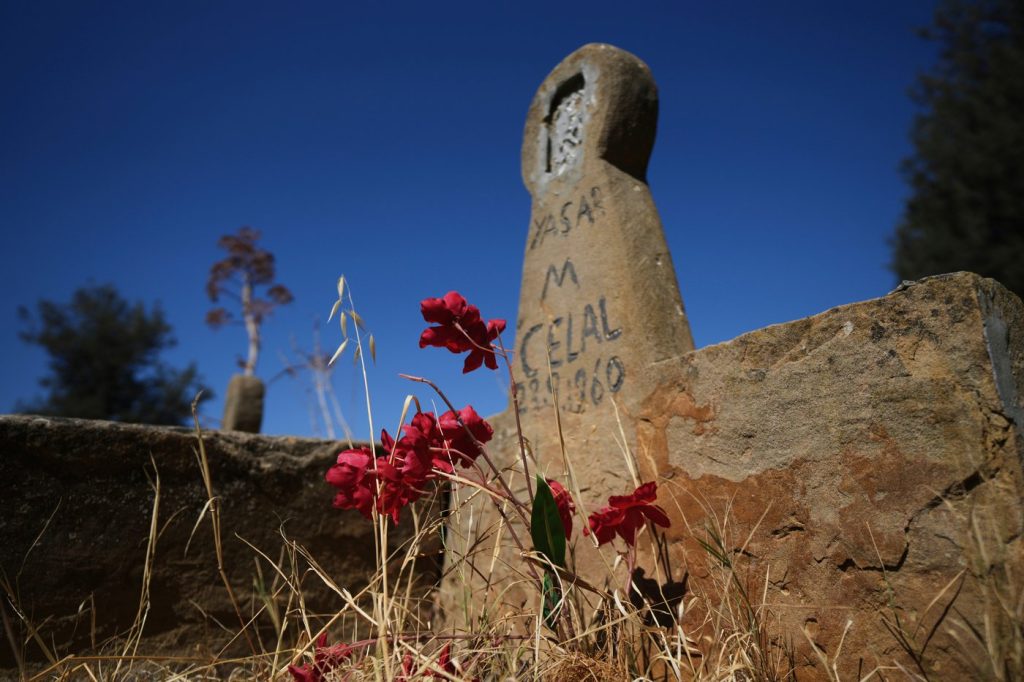TOCHNI, Cyprus (AP) — The lingering scars of the war in ethnically divided Cyprus extend even to the resting places of the deceased, where the effects of a decades-long conflict continue to shape the landscapes. In the northern third of the island, controlled by Turkish Cypriots, shattered granite crosses are scattered across Greek Cypriot cemeteries. Meanwhile, in the Greek Cypriot south, Muslim headstones in Turkish Cypriot cemeteries are hidden beneath a thick layer of overgrowth. For many years, from 1974 until 2003, the United Nations-controlled buffer zone prevented families from crossing to honor their deceased loved ones.
Since the Turkish invasion in 1974, which was prompted by a coup aimed at uniting Cyprus with Greece, the aftermath has dramatically altered hundreds of cemeteries, serving as a poignant reflection of the island's political and geographic divide. As hopes for bilateral talks to resolve the situation seem dim, Greek and Turkish Cypriots have begun collaborating on initiatives to rebuild trust and foster peace, starting with the restoration of cemeteries.
Currently, efforts are underway to restore 15 civilian cemeteries on either side of the so-called Green Line, representing a substantial project worth approximately 700,000 euros (around $815,000). The initiative's expansion to include additional cemeteries is being actively considered. “The maintenance and restoration of cemeteries constitutes one of the most symbolic and morally pressing acts for a place that strives for reconciliation,” remarked Sotos Ktoris, a Greek Cypriot involved in overseeing this project.
The division of Cyprus saw around 160,000 Greek Cypriots flee to the internationally recognized southern government following the Turkish invasion, while 45,000 Turkish Cypriots moved to the north, where they proclaimed independence in 1983. To this day, only Turkey acknowledges the legitimacy of the northern authorities. As a result of these shifts, caretakers of both Christian and Muslim burial sites were displaced, leading to the vandalism of churches in the north and the neglect of mosques in the south.
In a bid to rectify historical grievances, both sides, with the backing of international organizations, have engaged in restoring places of worship and cemeteries. Earlier this year, Greek Cypriot President Nikos Christodoulides and Turkish Cypriot leader Ersin Tatar expanded the scope of the restoration committee's efforts to include cemetery projects, with funding support from the European Union and assistance from the United Nations. Work officially commenced in May 2023.
A recent restoration effort took place in Tochni, where Greek Cypriot workers began rebuilding a century-old stone wall at a Muslim cemetery. This village, which was predominantly Turkish Cypriot before the invasion, has seen many descendants returning to reconnect with their heritage and honor their ancestors. “Just as we demand that they respect us, our dead, and our religion, I believe that we owe the same respect to them,” stated Charoulla Efstratiou, the Greek Cypriot community leader in Tochni.
In Palaikythro, which Turkish Cypriots have named Balikesir, the restoration work includes righting broken crosses at the Greek Cypriot cemetery. Turkish Cypriot contractor Recep Güler described the challenges faced in restoring the cemetery's external walls and gate, emphasizing the importance of shared cultural heritage. Mürşide Erzen, the village’s Turkish Cypriot community leader, expressed her distress over the cemetery's condition and her commitment to restore it after she was appointed community leader.
While the maintenance of these cemeteries represents a critical aspect of the reconciliation process, the broader political context remains fraught. The last major attempt to negotiate a peace deal in Cyprus fell through in 2017, and both Turkish Cypriots and Turkey currently dismiss the U.N.-backed framework advocating for a federal reunification. They favor a two-state solution, which Greek Cypriots reject, fearing it cements Turkish influence on the island..
U.N. Secretary-General António Guterres has met with both Christodoulides and Tatar this year and is anticipated to continue facilitating dialogue in the upcoming months to keep the hope for peace alive.











